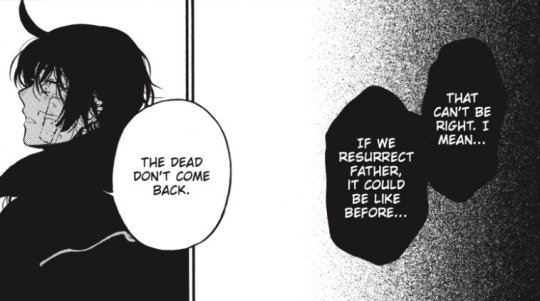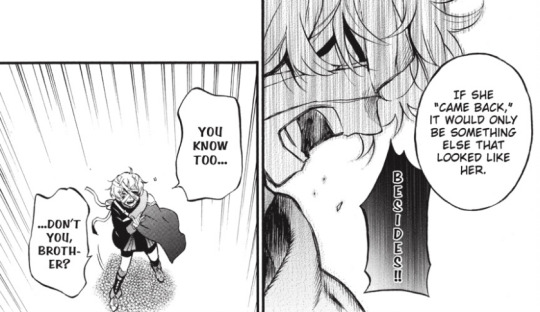#when encountering a vanitas character trait. assume it's a trauma response until shown substantial evidence otherwise
Text


Since writing my last post about how Vanitas understands "salvation" as the preservation of one's self, even at the price of death, I've been thinking about how that plays into Vanitas's thoughts on resurrection. It's only two short lines, but I find the view he expresses in this scene absolutely fascinating.
Vanitas tells Misha that the dead "don't come back," and the fact that he phrases it that way stands out to me. He doesn't say that resurrection is impossible on a physical level; he implicitly concedes that maybe Misha could "bring back" something that looks and acts like Luna. He doesn't quibble about the practicalities of reanimating someone whose body turned to ashes or bring up whatever concept of the afterlife he may have.
Instead, Vanitas says that a resurrected Luna would simply be "something else that looked like her." A resurrected Luna would lack some fundamental part of whatever it was that made Luna who they were in their first life.
But what would they lack? I don't think he's implying that a resurrected Luna would lack their soul—not really. Setting aside the absence of souls as a conceptual presence in VnC, I think that would be too concrete and specific for what Vanitas is gesturing toward. Rather, he's conceiving of the Self in a somewhat ineffable way. On a metaphysical level, a version of Luna brought back from the dead simply Wouldn't Be Her, and he can't put it in more concrete terms than that.
So why does he think this way?
I think the concept of resurrection is awful enough to Vanitas that he has to reject it outright for his own stability. He cannot even slightly entertain the notion that resurrection might be possible, because that would destroy one of his main coping mechanisms.
Resurrection is nightmarish to a man that relies on death as an escape. Vanitas is suicidal, but beyond his self-hatred, his relationship to death is very particular. He's someone whose body and being has been corrupted and violated several times—through violence, through experiments, and through Luna's bite, and he's desperate to retain control of himself in the aftermath. He's desperate for control in regards to everything in his life, but especially his body and his death.
Vanitas is being slowly transformed into something inhuman, and he plans to die someday to escape that fate. The idea that after he's gone, someone could override that decision and force him back into living a life he doesn't want must be unacceptably horrific to him. He dismisses it out of hand because he has to.
Vanitas says a resurrected Luna would, on some level, not really be Luna. Whatever comes back might look like them, but it would lack some fundamental self that makes Luna "Luna." Thus, if Vanitas himself were ever "resurrected" after his death, it would be the same. Death remains an absolute escape for him, and even if someone contrives to bring back something that looks like him after he's gone, it won't be him. That life won't be his problem.
In addition to whatever beliefs Vanitas might have about death and afterlives the feasibility of resurrection, I think this is a key part of his relationship to the concept. He lives his life knowing that death waits for him as an escape valve. He needs that looming death as his salvation. Thus, faced with the concept of resurrection, his argument basically boils down to "nuh-uh." He shoots down the concept and declares that a resurrected person wouldn't be themselves in some nonspecific way, because the possibility of anything otherwise isn't something safe for him to consider.
#of course. it's not out of the question that Vanitas has actually encountered a botched resurrection before and is speaking from experience#but occam's razor and all that#or mochijun's razor:#when encountering a vanitas character trait. assume it's a trauma response until shown substantial evidence otherwise#vnc#vanitas no carte#the case study of vanitas#vanitas#vanitas my beloved#english major hours#ID in alt text#I briefly wonked up posting this but I think it's normal now
110 notes
·
View notes